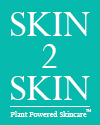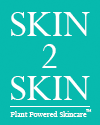By Kenneth Simpson, Skin 2 Skin CEO, Chief Formulator and Co-Founder
Know the Difference between Natural and Organic Skincare and what you want to achieve. Many Organic Skincare products lack the ability to be as effective as Skin 2 Skin Natural Anti-Aging Skincare brand. Skin 2 Skin is based on solid “Holistic Skin Wellness™” science revolutionizing the skincare market by finding the perfect synergistic balance between science and nature.
Organic needs heavy fragrance natural, 50/50 a blend of natural and synthetic or synthetic to mask the smell or replicate the smell of the fruit and color to camouflage the negative appearance. Skin 2 Skin uses no colors or dies and only 4 of our products has our trade secret White Tea blend of extracted oils of White Tea, Neroli, Jasmine, Orange, Spearmint, Lemon and Borgamot highly beneficial to aging skin and natural scent.
There are three organic labeling categories, based on organic food content excluding water and salt. “100% Organic” means that the product must contain only organically produced ingredients and may display the USDA Organic Seal with approval. For “organic” claims, the product must contain a minimum of 95% organically produced content, and the remainder must be substances approved on the National List. Any other type of Organic Skincare must say “made with organic ingredients” statement somewhere on the label, the product must be at least 70% organic.
In 2009, an American National Standard (FDA/USDA) known as NSF/ANSI 305: Personal Care Products Containing Organic Ingredients was created. This is the only US government standard that defines both production and labeling requirements for personal care products containing organic ingredients. To become certified to this standard, product must undergo a thorough review by an independent organic certification organization to verify that a manufacturer’s product formulation contains at least 70% organic content by weight. The percentage of Organic must appear on the label and should appear on the website if they are honest and forthright.
For marketing purposes a company can put Organic on the front of the label example “XYZ Skincare, Organic” as long as the ingredient side states made with organic ingredients somewhere on it meaning it only contains 70% organic not the 95% organic your being lead to believe is in the product. So when purchasing note the difference in the “sales pitch” and look for “products containing up to 95% organic”. Another key point is 95% organic may be in reality only one product has to contain 95% organic ingredients for a company to claim this…not all. If you really want to know ask for a list of products with the percent of organics by product this is what the NSF recommends if you’re shopping for organics.
Natural generally is defined as: Ingredients derived, in whole or in part, from natural sources with no synthetic compounds.
It can become confusing because of marketing and the blurred line in cosmetics / skin care. Many cosmetic companies will claim natural when their product contains high amounts of synthetic ingredients excluding water and salt. At this time there are no government standards for natural skin care so there is a large grey marketing area that companies work within.
This is where you the consumer must educate yourself on natural and organic products. If you are looking for a natural skin care line look for the products that have the largest amount of natural plant derived ingredients. A natural skin care line that is committed to you knowing everything on the label list: the chemical name and the plant it is derived from nest together example; Capric/Cprylic Traglyceride (Coconut Oil) and you should find every product ingredient deck on their website if you don’t move on…
Ingredients like mineral oil made from petroleum, talc that is the same as asbestosis that are dangerous in powder form are considered natural ingredient. It is up to you as the consumer to look at the ingredient deck.
How do you determine if a product is a true natural product look at the ingredient deck and research the ingredients? You need to do this even for organic products because there are a number of ingredients on the Cosmetic National List of Allowed and Prohibited Substances, excluding Parabens that are toxic to none reproductive and reproductive organs, hormone disruptive and reproduction leading to possible long term serious health issues even cancer over long term exposure and multiple product use building up in the organs.
Is organic safer for you and better for the environment than natural? An ingredient’s source does not determine its safety or if it is better for the environment it’s all marketing by the organic companies. Many plants whether or not they are organically grown contain substances that may be toxic or allergenic. Also organic can use any non-agriculture ingredient in their 30% that can be toxic but on the safe ingredient list. I see is all the time!
Non organic, natural ingredients include toxic pesticides. Fact is No! After a plant is harvested and processed to be included in a cosmetic product, no pesticides remain-not even a trace. The sterilization and manufacturing process cleans all the stuff away, including any pesticides.
Organic is none irritating and safer. Fact an Irritant is an Irritant even if it is organic or natural. Many of the plant extracts such as peppermint, menthol, eucalyptus, rosemary, sandalwood, and some essential oils, daily / over use of AHA’s and Sorbic Acid are routinely included in organic and natural products. Research has clearly established these ingredients are irritants, and when the skin is irritated it causes the elastin to break down ending in sagging skin causing the collagen to break down increasing wrinkles and loss of volume and hurts the skin’s ability to heal. That is why you will not find such ingredients in Skin 2 Skin, Natural Skincare products.
Both natural and organic incorporate botanical and or herbal ingredients into their formulation. Botanical-based provides multiple functionalities and highly active ingredients benefiting the products effectiveness as in Skin 2 Skin Natural Skincare. Because of this they are usually marketed as the main therapeutic components. However be careful the botanicals should have scientific research and traditional medicine to back up the marketing claim. Some botanical extract primary functions are an emollient / skin conditioner and also used as fillers that is very important in a formulation and benefiting the skin but have no therapeutic component in products. Some will market that this botanical is therapeutic because of a far reaching unproven therapeutic benefit claim.
Is Organic more effective anti-aging than Natural products? Fact is No! They both have their positives and negatives and depend on age and your skin needs. If you want the scientific advances found in natural products look for the brand that has high plant based ingredients with the advanced ingredients that include bio-identical bio-active peptides without toxins or irritating ingredients.
When I lived in NYC developing products traveling to Japan, I developed an east / west philosophy and studied ancient eastern skin care treatments, plants, organics and western anti-aging ingredients developing Skin 2 Skin’s foundation “Holistic Skin Wellness”. I found that the perfection in life, by reversing the appearance of skin damage and premature skin aging of my own skin from radiation burns is that any quality skin care product must contain the essential nutritional building blocks to life that including multiple antioxidants, vitamins, minerals, enzymes, and actives. High performance quality skin care products must be synergistic and be in perfect harmony with the skin for the best results that you experience with Skin 2 Skin Natural Plant Powered Anti-Aging Skincare.
Copyright 2016 Skin 2 Skin Skincare


